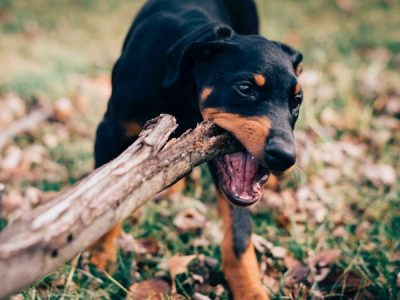On January 2, a one-and-a-half-year-old girl broke her leg at three places after a Pitbull dog mauled her in Delhi’s Burari area. The toddler remained in hospital for 17 days and got 18 stitches. The entire incident was recorded on CCTV and went viral on social media, sending shockwaves across the country.
The incident prompted many social media users to demand a ban on such ‘ferocious’ and ‘dangerous’ dog breeds. In another similar incident, a seven-year-old girl was brutally attacked by an American Bully while playing with her friends in the Shahbad Dairy area. The girl reportedly suffered multiple injuries around her eyes, hands, back and face.
Such incidents have created furore over the internet with many worried about the growing ‘dog menace’ on the streets of the national capital.
The pet-dog bites come at a time when the city is already grappling with the ‘street dog menace’.
According to the Ministry of Health and Family Welfare, Delhi saw a 143 per cent rise in dog-bite cases in 2023 compared to 2022. The national capital recorded a total of 16,133 incidents in 2023, as compared to just 6,634 incidents the year before.
However, Delhi has seen an 85 per cent decline in dog-bite incidents in the last five years — from 1,07,642 cases in 2018 to 16,133 in 2023.
On December 6, 2023, the Delhi High Court asked the Centre to decide expeditiously, preferably within three months , a representation to ban and cancel the licence to keep ‘dangerous’ dog breeds such as Pitbull, Terriers, American Bulldog and Rottweiler.
Many of these ‘ferocious’ dog breeds are banned in certain cities by their respective municipalities across India. For instance, in November 2022, the civic body of Gurugram, passed an order banning 11 foreign breeds considered ‘dangerous’. These are American Pit-bull Terriers, Dogo Argentino, Rottweiller, Neapolitan Mastiff, Boerboel, Presa Canario, Wolf Dog, Bandog, American Bulldog, Fila Brasileiro and Cane Corso.
In the same year, following similar incidents, Ghaziabad civic body also put a ban on three dog breeds: Pitbull Rottweiler, and Dogo Argentino.

However, there are no such orders in Delhi. No wonder, these breeds remain popular in the Delhi-NCR region. Section 399 of the Delhi Municipal Corporation Act states that registration of pet dogs by their owners is mandatory in Delhi.
“The central government has notified the Dog Breeding and Marketing Rules in 2017. However, its enforcement is zero in Delhi. Not a single dog is registered. People are breeding Pitbulls, Mastiff and all other kinds of bully dogs,” says Gauri Maliki, Trustee of People for Animals, a not-for-profit based in Delhi.
“The breeding and registration are not effectively enforced by the Municipal Corporation of Delhi as per the The Prevention of Cruelty to Animals Act, 1960,” she adds.
The absence of effective enforcement for registration, breeding and marketing laws, has given rise to many people breeding, buying and keeping these dogs illegally and unethically, she alleges.
IRRESPONSIBLE PET PARENTING
Aaron Di Silva, a Delhi based pet behaviourist, says, “Often due to advertisements and social media, many adopt or buy a foreign breed dog without giving due thought.
“These dogs need rigorous training, parenting and care. They need to be properly fed, exercised and given veterinary care. An absence of it would lead to unexpected or aggressive behaviour,” Silva explains.
However, such behaviour is common to all dogs, not just particular foreign breeds. Maulekhi also blames irresponsible pet adoption and parenting behind increased dog bites among pet dogs.
“Specific species of dogs have intrinsic behavioural characteristics. Some are unsuitable to be kept confined in small apartments or small houses because dogs like other animals require an adequate amount of exercise and enrichment. Once that is not given, the likelihood of them becoming ferocious is very high,” she explains.
“However, whether pet dogs or stray dogs are responsible for increase in dog bites, cannot be ascertained as we [authorities] do not keep a record of dog breeds while counting dog bites,” she adds.
UNETHICAL DOG BREEDING
“Dog sellers at times indulge in worst kind of breeding exercise. They use the female dog as a birthing machine. Healthy breeding happens once in two years, but unethical breeders end up making sure that the mother dog gives birth twice or at times thrice a year,” explains Silva on the rampant unethical breeding practices.
“This damages both mental and physical well-being of the dog. The puppies can become malnourished and come out very hyper. Sometimes they have very destructive behaviour as well,” he adds.
Commenting on the issue of unethical breeding in Delhi- NCR, Maulekhi says, “In the semi-urban areas near Delhi-NCR, unregulate breeding of such ferocious dogs is being done rampantly.
“Breeders usually use very invasive techniques such as incest breeding. Use of rape or breeding stand, hormones to induce heat in female is rampant at these unregulated breeding hotspots.”
CLIMATE AND DOG BEHAVIOUR
Weather is a big reason behind dog bites, explains the pet behaviourist. Delhi experiences extreme weather conditions. There are long spells of heat-wave and cold-wave. Many foreign breeds are ill-suited for such weather conditions.
“Dog breeds like Saint Bernard, Huskies, Pugs, Chow-Chow and even Golden Retriever are not suitable for Delhi weather. Some of these species have long hair and multiple folds of skin. Keeping them under such conditions can irritate them, turning them aggressive,” adds Maulekhi.
Golden Retrievers, Pitbulls, and Greyhounds need large space and parks to walk and run.
When asked about breeds which suit Indian weather conditions, Pet behaviourist Silva advised, “There are so many dogs waiting in shelter homes for humans to adopt them. If people want to have a pet, they should adopt an Indian breed.”





